|
|
|
Sort Order |
|
|
|
Items / Page
|
|
|
|
|
|
|
| Srl | Item |
| 1 |
ID:
133202
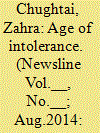

|
|
|
|
|
| Publication |
2014.
|
| Summary/Abstract |
To ensure our success as nation, we need to turn our attention to the country soul since the vast subcontinent was divided, and than some 20 odd years later sub-divided once again, Pakistanis have plenty to ponder.
|
|
|
|
|
|
|
|
|
|
|
|
|
|
|
|
| 2 |
ID:
133305
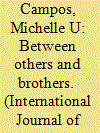

|
|
|
|
|
| Publication |
2014.
|
| Summary/Abstract |
Some fifteen years ago, the Israel Museum exhibition "To the East: Orientalism in the Arts in Israel" featured a photograph by the Israeli artist Meir Gal entitled "Nine Out of Four Hundred: The West and the Rest." At the center of the photograph was Gal, holding the nine pages that dealt with the history of Jews in the Middle East in a textbook of Jewish history used in Israel's education system. As Gal viscerally argued, "these books helped establish a consciousness that the history of the Jewish people took place in Eastern Europe and that Mizrahim have no history worthy of remembering." More damningly, he wrote that "the advent of Zionism and the establishment of the Israeli State drove a wedge between Mizrahim and their origins, and replaced their Jewish-Arab identity with a new Israeli identity based on European ideals as well as hatred of the Arab world."
|
|
|
|
|
|
|
|
|
|
|
|
|
|
|
|
| 3 |
ID:
132961
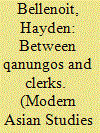

|
|
|
|
|
| Publication |
2014.
|
| Summary/Abstract |
This paper argues that our understanding of the transition to colonialism in South Asia can be enriched by examining the formation of revenue collection systems in north India between 1750 and 1850. It examines agrarian revenue systems not through the prism of legalism or landholding patterns, but by looking at the paper and record-based mechanisms by which wealth was actually extracted from India's hinterlands. It also examines the Kayastha pensmen who became an exponentially significant component of an Indo-Muslim revenue administration. They assisted the extension of Mughal revenue collection capabilities as qanungos (registrars) and patwaris (accountants). The intensity of revenue assessment, extraction and collection had increased by the mid 1700s, through the extension of cultivation and assessment by regional Indian kingdoms. The East India Company, in its agrarian revenue settlements in north India, utilized this extant revenue culture to push through savage revenue demands. These Kayastha pensmen thus furnished the 'young' Company with the crucial skills, physical records, and legitimacy to garner the agrarian wealth which would fund Britain's Indian empire. These more regular patterns of paper-oriented administration engendered a process of 'bureaucratization' and the emergence of the modern colonial state.
|
|
|
|
|
|
|
|
|
|
|
|
|
|
|
|
| 4 |
ID:
130580
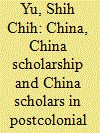

|
|
|
|
|
| Publication |
2014.
|
| Summary/Abstract |
China scholarship in Taiwan, in social sciences as well as humanities disciplines, is constituted by the choices of scholars over encountered and constantly reinterpreted imaginations of how China's names, identities and images are contextualised. Due to its colonial history, its civil war and Cold War legacies, and internal cleavages, China scholarship in Taiwan is characterised by strategic shifting among the Japanese, American and Chinese approaches to China, as well as their combination and recombination. The mechanism of choice, including travels that orient, reorient and disorient existing views on China, produces conjunctive scholarship. The rich repertoire of views on China, together with the politics of identity, challenge the objectivist stance of the social sciences to the extent that no view on China could be exempted from political implications and politicised social scrutiny. Concerns over exigent propriety in a social setting are internal to knowledge production. Therefore, understanding the process with which the historically derived approaches inform the China scholarship in Taiwan through the mechanism of encountering reveals both the uncertain nature of knowledge, in general, and the uncertain meaning associated with China worldwide, in particular
|
|
|
|
|
|
|
|
|
|
|
|
|
|
|
|
| 5 |
ID:
131459
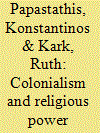

|
|
|
|
|
| Publication |
2014.
|
| Summary/Abstract |
This article critically assesses the conflict within the Orthodox Church of Jerusalem between the Greek hierarchy and the Arab laity concerning the proposals of the Mandatory Government for a new regulatory framework for patriarchal operation. The British presented two draft reform ordinances, neither of which met Arab expectations. Instead of promoting the laity's emancipation from 'foreign' Greek administrative and financial control, the ordinances left little room for a true inversion of the power structure between the two opposing camps, retaining the status quo at the expense of the Arab Orthodox rights.
|
|
|
|
|
|
|
|
|
|
|
|
|
|
|
|
| 6 |
ID:
132970
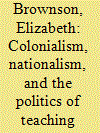

|
|
|
|
|
| Publication |
2014.
|
| Summary/Abstract |
For Palestinian nationalists in Mandate Palestine, British education policy was a source of constant frustration. The shortage of schools, the lack of local control over the curriculum, and the marginalization and de-politicization of Palestinian history constituted major grievances. Proceedings from the Peel Commission reveal much about the rationale behind this policy, particularly the bias toward "rural" education and the attempts to control teachers. Drawing on and complementing the work of A.L. Tibawi, this article seeks to shed light on the nationalists' protests by examining both the responses of officials brought before the Commission, as well as the government's history curriculum during the Mandate. In doing so, the research shows that education policy was constructed to maintain the underdevelopment of Palestine and to hinder state-building efforts that could compete with those of the Zionists.
|
|
|
|
|
|
|
|
|
|
|
|
|
|
|
|
| 7 |
ID:
126653


|
|
|
|
|
| Publication |
2013.
|
| Summary/Abstract |
As Professor Ian Brown's recent work on the colonial prison in British Burma has shown, the proportion of the population convicted of crimes was routinely and markedly higher than in any other province of British India. Part of the explanation for the exceptionally high figures may be the colonial criminalization of practices that were previously lawful. Gambling was one such activity that the British, at least according to their rhetoric, were intent on prohibiting as part of their 'civilizing mission'. However, in practice colonial law was more ambiguous and equivocal. Government prosecutors and judges disputed the definition of gambling and struggled to differentiate it from other tolerated practices. Beyond these legal difficulties, individual British officials often found it necessary to turn a blind eye to gambling. On an everyday level, subordinate officials in the police and magistracy had an ambivalent relationship with gambling. Although empowered to suppress it, some chose to ignore its presence and others still were actively conniving with it. By studying how the British sought to control gambling in the colony at the turn of the twentieth century, this article seeks to restore the full complexity to the history of criminality in colonial Burma.
|
|
|
|
|
|
|
|
|
|
|
|
|
|
|
|
| 8 |
ID:
130577
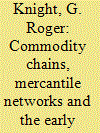

|
|
|
|
|
| Publication |
2014.
|
| Summary/Abstract |
This paper discusses the foundational history of a major European mercantile house in colonial South East Asia in the context of commercial developments that had both a regional and global reach. In so doing, it seeks to relate a local and historically particular event to a broader world pattern defined by three rapidly evolving commodity chains, based respectively on the production, distribution and consumption of cotton goods, coffee and opium. In this context, the paper argues that the hard-won commercial success of the firm in question resulted from a significant degree of withdrawal from the bilateral ties between colony and metropolis inherent in the cotton and coffee commodity chains. In their place, the firm had recourse to several varieties of the inter-Asian trade, of which the opium commodity chain constituted the key dimension.
|
|
|
|
|
|
|
|
|
|
|
|
|
|
|
|
| 9 |
ID:
128513
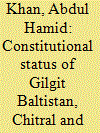

|
|
|
|
|
| Publication |
2013.
|
| Summary/Abstract |
Before the partition of the Indian sub-continent, the British handed over the tiny states including Yasin, Punial, Gupis, Ishkoman, Gilgit, Nagar, Hunza, Astore and Chilas to the Maharaja of Kashmir. Chilas was under the suzerainty of Yasin even after 1947. Before 1860, Mastuj (now part of Chitral), Gupis and Ishkoman were also integral parts of Yasin. After the murder of British spy Col. George Hayward by the Yasin ruler Mir Wali in 1873, differences between the State of Yasin and the British government had deepened. The British reacted by separating Mastuj, Koh Ghizer, Gupis and Ishkoman from Yasin. Rundu, Kharmang, Skardu, Ladakh and Astore remained under the direct control of Maharaja of Jammu and Kashmir. Before the partition of India, the Maharaja of Kashmir, on 1 August 1947, took over the administration of the entire Gilgit-Baltistan, i.e., former Gilgit Wazarat north of the Indus and all political districts. The area together with Bonji formed the Gilgit frontier province. Maharaja of Kashmir appointed Brigadier Ghansara Singh as the Governor, and also sanctioned the budget for the Gilgit frontier province.
|
|
|
|
|
|
|
|
|
|
|
|
|
|
|
|
| 10 |
ID:
126656
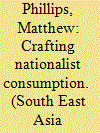

|
|
|
|
|
| Publication |
2013.
|
| Summary/Abstract |
Following the revolution of 1932 that ended absolute monarchy in Siam, a new government came into power that sought to legitimize its rule by encouraging mass identification with the state. Practically, the expansion of a wage economy and the development of a state-led education system were seen by government officials as central to promoting a sense of citizenship to as yet disinterested rural communities. Throughout its first decade in power, the government thus set up projects to provide such groups with skills that might contribute to their overall material advancement. Following the lead of similar endeavours, particularly in India, one of the principal ways in which it would do this was through the production and bringing to market of cotton textiles. However, with foreign imports both superior in quality and cheaper than anything produced internally, the state struggled to establish a public relations message that might convince consumers to purchase Thai-produced textiles. As a result of specific limitations rooted in Thailand's ambiguous status globally, this meant that Thai leaders struggled to replicate the success of such movements elsewhere
|
|
|
|
|
|
|
|
|
|
|
|
|
|
|
|
| 11 |
ID:
127058
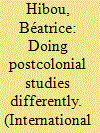

|
|
|
|
|
| Publication |
2013.
|
| Summary/Abstract |
Mohamed Tozy is certainly one of the better known Moroccan intellectuals in the Arab world and in Europe, in particular for his publication of the book Monarchie et islam politique au Maroc (Monarchy and Political Islam in Morocco) which is a classic in social sciences and political studies.2 He is a Professor at the Institute of Political Science (Institut d'Etudes Politiques, IEP) in Aix-en-Provence and at the Hassan II University in Casablanca and also a researcher at LAMES (LAboratoire MEditerranéen de Sociologie) of the Maison Méditerranéenne de Sciences Humaines d'Aix-Marseille as well as at CHERPA (Croyance, Histoire, Espace, Régulation Politique et Administrative). In 2005, he set up the Centre Marocain des Sciences Sociales (CM2S), which is the first one of its kind in social sciences in Morocco to have included a doctoral school. He is presently in the process of setting up a faculty for social sciences at the Mohamed VI polytechnic University
|
|
|
|
|
|
|
|
|
|
|
|
|
|
|
|
| 12 |
ID:
124874
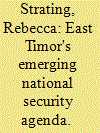

|
|
|
|
|
| Publication |
2013.
|
| Summary/Abstract |
This article focuses on the steps East Timor has taken to bolster its defense sector following its attainment of independence in 2002. In International Relations, scholars have often argued that the ability to defend territory and population from external threat is an essential component of sovereign statehood. Literature on post-colonial sovereignty, however, suggests that the external sovereignty of "weak" post-colonial states is more likely to be protected through international legal recognition. In recent years, East Timor has sought to develop their defense capacities in line with conventional thinking about security and "real" independence. This influences the foreign relations of East Timor and also has broader implications for understanding security and independence in post-colonial states.
|
|
|
|
|
|
|
|
|
|
|
|
|
|
|
|
| 13 |
ID:
126645


|
|
|
|
|
| Publication |
2013.
|
| Summary/Abstract |
This paper considers the recruitment of volunteer levies into British forces in northern Burma during the Second World War. Using data compiled by a local veterans' association, the paper raises questions about the supposed historical continuities that are believed to exist across military forces of the pre- and post-war periods. The data indicate that prevailing assumptions about the motivations and aspirations of local recruits should be challenged more than they have been to date. The author proposes new approaches to using quantitative data to reveal broader social trends in issues of military recruitment that could be extended into other times and places. Such methods could be particularly helpful in facilitating deeper and more nuanced demographic and social insights into Burma's history of internal militarized conflict and the ways in which recruitment practices relate to the communities from which recruits are drawn.
|
|
|
|
|
|
|
|
|
|
|
|
|
|
|
|
| 14 |
ID:
133304
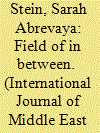

|
|
|
|
|
| Publication |
2014.
|
| Summary/Abstract |
In the spring of 1902, Miryam bint Lalu Partush appealed to military representatives in Ghardaïa, in the Mzab Valley (a valley of five fortified oasis cities in the northern Algerian Sahara, six hundred kilometers south of Algiers), for the paperwork that would allow her to undertake a six-month pilgrimage to Jerusalem with her husband, the wealthy merchant Musa (Moshe) bin Ibrahim Partush. Miryam Partush was unusual in possessing the means for such a rare, costly voyage; but notwithstanding her class, Partush's legal status was typical of most Muslims and southern Algerian Jews in Algeria. She was not a citizen, nor did she hold official papers of any kind. When Miryam Partush appealed to the military authorities in Ghardaïa, then, she was appealing for many things: for the right to leave her native valley and travel to the port of Algiers; for the papers that would allow her to cross colonial boundaries; and for the documentation that would register her liminal legal identity. Authorizing her travel, Algeria's governor-general named Partush a "non-naturalized Jew from the Mzab." Thus did Partush embark on her six-month journey with a negative legal identity: this Jewish woman was definable, in the eyes of the law, only by what she did not possess.
|
|
|
|
|
|
|
|
|
|
|
|
|
|
|
|
| 15 |
ID:
132971
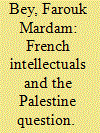

|
|
|
|
|
| Publication |
2014.
|
| Summary/Abstract |
This article focuses on intellectuals-writers, philosophers, academics, scientists, and artists-who, by virtue of their accomplishments and talents, or simply because of their renown, wielded such moral authority that they became at times veritable "leaders of conscience," influencing public opinion and, indeed, government policy in France. Responding to major events, whether colonial wars, international crises, or significant domestic political battles, French intellectuals weighed in time and again, from the Dreyfus affair to the bogus Sarkozy debate on "national identity."1 This article reviews the stance of French intellectuals on the question of Palestine and the wider Arab-Israeli conflict, and examines how the ideological and political assumptions underlying their positions were not always amenable to rational explanation or easily ascribed to traditional attitudes of the Left and Right.
|
|
|
|
|
|
|
|
|
|
|
|
|
|
|
|
| 16 |
ID:
128882
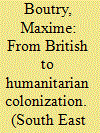

|
|
|
|
|
| Publication |
2013.
|
| Summary/Abstract |
The humanitarian response to the disaster caused by Cyclone Nargis that hit the Ayeyarwady Delta region of Myanmar in 2008 is a pertinent example of a very specific phase in humanitarian response at the transition between emergency and development. The author shows that this phase, known as 'early recovery', being built on the specific characteristics of the emergency (lack of time and lack of means and input) and oriented towards development, is one in which the humanitarian aid agency is relatively restricted to the humanitarian sphere itself. As a result, the ideological discourse lengthily denounced by the post-structuralist anthropology of development - as a set of Western values imposed on the 'developing' countries to assert a new form of dominion - is actually powerful and quasi-monolithic in shaping the consequences of humanitarian aid. While there is no 'arena' for the 'beneficiaries' to discuss the aid's agency, a 'methodological populism' approach reveals, on the one hand, the antagonisms between a humanitarian ideology conveying considerations such as 'horizontal' communities versus 'hierarchical bonds' and, on the other, the similarity of its socioeconomic consequences on the Delta's society to those of the British colonial period.
|
|
|
|
|
|
|
|
|
|
|
|
|
|
|
|
| 17 |
ID:
132993
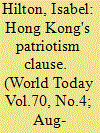

|
|
|
|
|
| Publication |
2014.
|
| Summary/Abstract |
It is the first such paper the Chinese government has produced since the 1997 handover, and its critics see it as a unilateral re-framing by China of the concept of One Country, Two systems, the late Deng Xiaoping's formula for the co-existence of Hong Kong's capitalism with Beijing's socialism with Chinese characteristics.
|
|
|
|
|
|
|
|
|
|
|
|
|
|
|
|
| 18 |
ID:
130475
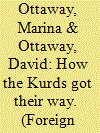

|
|
|
|
|
| Publication |
2014.
|
| Summary/Abstract |
The surge of ethnic and sectarian strife in Syria and across the Middle East has led a number of analysts to predict the coming breakup of many Arab states. This potential upending of the region's territorial order has come to be known as "the end of Sykes-Picot," a reference to the secret 1916 Anglo-French agreement to divide up the Middle Eastern provinces of the Ottoman Empire into British and French zones of control. Because the European treaties that created new Arab states in the aftermath of World War I upheld the outlines of that agreement, Sykes-Picot became the convenient shorthand for the map that colonial powers imposed on the region, one that has remained essentially constant to the present day.
With bloodshed from Aleppo to Baghdad to Beirut, it is indeed tempting to predict the violent demise of Sykes-Picot. But although the worst fighting is spilling over borders and pushing some countries, such as Syria, toward fragmentation, there is another force crossing national lines and even realigning national relationships: trade. New transnational zones of economic cooperation are making Middle Eastern borders more porous, but in a way that does not directly challenge existing states. Instead, mutual economic interests, especially in the oil and gas industries, may signal a softer end to Sykes-Picot.
|
|
|
|
|
|
|
|
|
|
|
|
|
|
|
|
| 19 |
ID:
131899
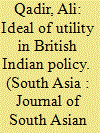

|
|
|
|
|
| Publication |
2014.
|
| Summary/Abstract |
The now natural ideal of defining higher education through its societal utility is a relatively recent historical formation, and in the case of South Asia, its construction is entangled with the colonial history of the institutionalisation of modern higher education in the nineteenth century. Drawing on Robert Young's history of the Bentham-inspired 'chrestomathic' University of London, this article reviews the shifting construction of practicality in British Indian higher education policy in the formative period between 1835 and 1904. The article underlines the continuities and ruptures over time in the policy rhetoric of utility as a normative ideal and points out some implications for understanding colonialism
|
|
|
|
|
|
|
|
|
|
|
|
|
|
|
|
| 20 |
ID:
131433
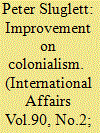

|
|
|
|
|
| Publication |
2014.
|
| Summary/Abstract |
The mandate system was created as part of the overall machinery of the League of Nations in an attempt to 'promote world peace' in the aftermath of the First World War. The 'A' mandates, with which this article is concerned, were the former Arab provinces of the Ottoman Empire that had been occupied and conquered by France and Britain by the end of the war. Was the mandate system in any sense an improvement on colonialism? To the extent that the period of foreign rule was rather short in comparison with other colonial regimes, one can perhaps say that it was. On the other hand, however high-minded its stated aims, the mandate system was a product of the imperial framework of its day, in which the white races were regarded as superior to the brown or black races. The supervisory instruments of the League (specifically the Permanent Mandates' Commission) were inadequate to deal with any shortcomings on the part of the mandatory, and there are a number of examples of situations where, for example, the legitimate interests of minorities were ignored to suit the wider interests of the powers. In general, the mandated states lacked institutional underpinning, and their immediate legacy was a string of weak states throughout the Arab world, where many of the institutions of civil society were destroyed in the course of military coups in the 1950s and 1960s.
|
|
|
|
|
|
|
|
|
|
|
|
|
|
|
|
|
|
|
|
|